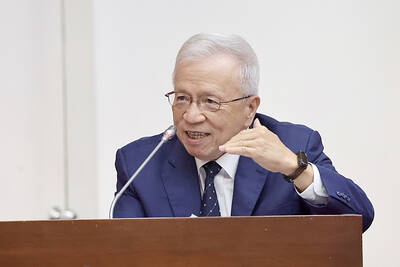Fubon Financial Holding Co (富邦金控) chairman Daniel Tsai(蔡明忠) said on Saturday he would triple sales of its sports lottery, launched on May 2, to NT$30 billion (US$990.62 million) within a year.
“We will work on an online platform that allows buyers to place bets 24 hours a day,” Tsai told reporters at the company’s tree-growing benefit in Hsitou, Nantou County, on Saturday.
Tsai said that through the online platform, lottery buyers would be able to place bets using their mobile phones and cable TV.
Before the platform is set up and approved by regulators, the company will reinforce its outlet shops to boost sales, which are expected to hit NT$10 billion after the launch next month.
The company’s former G-tech equipment, which it previously used when it operated the nation’s charity lottery sales, will be reused at its outlet shops for the sports lottery next month, he said.
Tsai criticized the government’s decision last year to transfer the charity lottery’s right to Chinatrust Commercial Bank (中信銀) until 2013 in return for a higher NT$2 billion in annual fees to government coffers.
Despite the higher annual fees, the government will not benefit because sales under Chinatrust underperformed Taipei Fubon Bank’s (台北富邦銀) by more than 20 percent and only reached NT$60 billion annually, he said.
Local media reported that Fubon could be interested in winning back the charity lottery’s exclusive operating right in six years.

JITTERS: Nexperia has a 20 percent market share for chips powering simpler features such as window controls, and changing supply chains could take years European carmakers are looking into ways to scratch components made with parts from China, spooked by deepening geopolitical spats playing out through chipmaker Nexperia BV and Beijing’s export controls on rare earths. To protect operations from trade ructions, several automakers are pushing major suppliers to find permanent alternatives to Chinese semiconductors, people familiar with the matter said. The industry is considering broader changes to its supply chain to adapt to shifting geopolitics, Europe’s main suppliers lobby CLEPA head Matthias Zink said. “We had some indications already — questions like: ‘How can you supply me without this dependency on China?’” Zink, who also

At least US$50 million for the freedom of an Emirati sheikh: That is the king’s ransom paid two weeks ago to militants linked to al-Qaeda who are pushing to topple the Malian government and impose Islamic law. Alongside a crippling fuel blockade, the Group for the Support of Islam and Muslims (JNIM) has made kidnapping wealthy foreigners for a ransom a pillar of its strategy of “economic jihad.” Its goal: Oust the junta, which has struggled to contain Mali’s decade-long insurgency since taking power following back-to-back coups in 2020 and 2021, by scaring away investors and paralyzing the west African country’s economy.

BUST FEARS: While a KMT legislator asked if an AI bubble could affect Taiwan, the DGBAS minister said the sector appears on track to continue growing The local property market has cooled down moderately following a series of credit control measures designed to contain speculation, the central bank said yesterday, while remaining tight-lipped about potential rule relaxations. Lawmakers in a meeting of the legislature’s Finance Committee voiced concerns to central bank officials that the credit control measures have adversely affected the government’s tax income and small and medium-sized property developers, with limited positive effects. Housing prices have been climbing since 2016, even when the central bank imposed its first set of control measures in 2020, Chinese Nationalist Party (KMT) Legislator Lo Ting-wei (羅廷瑋) said. “Since the second half of

AI BOOST: Next year, the cloud and networking product business is expected to remain a key revenue pillar for the company, Hon Hai chairman Young Liu said Manufacturing giant Hon Hai Precision Industry Co (鴻海精密) yesterday posted its best third-quarter profit in the company’s history, backed by strong demand for artificial intelligence (AI) servers. Net profit expanded 17 percent annually to NT$57.67 billion (US$1.86 billion) from NT$44.36 billion, the company said. On a quarterly basis, net profit soared 30 percent from NT$44.36 billion, it said. Hon Hai, which is Apple Inc’s primary iPhone assembler and makes servers powered by Nvidia Corp’s AI accelerators, said earnings per share expanded to NT$4.15 from NT$3.55 a year earlier and NT$3.19 in the second quarter. Gross margin improved to 6.35 percent,